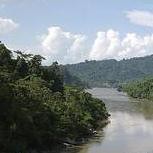 經過多年的反對運動之後,秘魯政府在6月14日宣布,取消亞馬遜河一條主要支流上的一座2000百萬瓦水力電廠的興建計畫。這座水壩的預定地在馬德雷德迪奧斯省(Madre de Dios)的伊納姆巴里河(Inambari)。
經過多年的反對運動之後,秘魯政府在6月14日宣布,取消亞馬遜河一條主要支流上的一座2000百萬瓦水力電廠的興建計畫。這座水壩的預定地在馬德雷德迪奧斯省(Madre de Dios)的伊納姆巴里河(Inambari)。
過去的36天以來,約2000人封鎖通往普諾地區的道路,並舉行大規模抗議活動,要求政府取消採礦優惠以及大壩工程。
經過與當地居民緊張的會議之後,委員會主席兼能源副部長Luis Gonzales Talledo決議取消興建計畫,同時撤銷EGASUR財團的開發許可。
當地的NGO農村教育服務組織(SER)成員Aldo Santos表示,「雖然這項決議無法阻止伊那姆巴里流域所有的水壩興建計畫,但重要的是它明確地阻止了EGASUR的計畫。」
Santos 表示,「決議指出,未來所有的興建計畫必須依照一個重要的先例,也就是《國際勞工組織第169號公約-原住民與部落》的內容,先與當地居民進行協商。」
受影響的社區居民長期反對伊納姆巴里大壩,大壩將淹沒410平方公里的森林,包括部分Bahujan Sonene國家公園的緩衝地帶。
興建計畫將讓15000人失去賴以維生的農田。蔓延120公里的大水將淹沒不久前興建的跨洋公路,切斷進入市場的道路,並且影響San Gaban以及普諾省Carabaya的經濟發展。
興建計畫取消對巴西政府而言是個打擊,巴西與秘魯在去年簽署了一項能源協議,承諾向祕魯購買其境內亞馬遜流域的六個水壩所產生的電力。
 伊納姆巴里大壩的興建經費達49億美金,預計由巴西國家開發銀行出資,並由巴西的營造公司興建。巴西2011-2020年的能源發展計畫中,包含了由祕魯亞馬遜流域引進7000百萬瓦的水力發電。
伊納姆巴里大壩的興建經費達49億美金,預計由巴西國家開發銀行出資,並由巴西的營造公司興建。巴西2011-2020年的能源發展計畫中,包含了由祕魯亞馬遜流域引進7000百萬瓦的水力發電。
伊納姆巴里大壩有非常先進的設計規劃,預計產生2000百萬瓦的電力,相當於目前祕魯國內1/4的裝置容量。
祕魯與巴西間第二項大壩計畫是Pakitzapango大壩,在2010年時,被一個名為Central Ashaninka del Rio Ene的原住民組織所提起的行政訴訟所終止。
在本月初,秘魯的非政府組織要求在七月新國會開議時,對秘魯與巴西間的能源協議進行公開辯論。
非政府組織在他們的聲明中說,「在該協議之下,我們選擇輸出我們的能源,卻對國家的社會與環境造成嚴重的影響。批准這項協議對於國家長久的永續發展相當的不利。」
總部設在加州的NGO國際河流組織拉美計畫專員Monti Aguirre表示,「巴西與秘魯都有豐富的替代能源,如果巴西在能源效率上進行投資,就可以避免在亞馬遜流域興建水壩,過程中也能夠節省數十億美金。」
雖然EGASUR已確定不會在伊納姆巴里進行工程,普諾的人民仍然在採礦與石油開發等議題上進行抗爭。
After years of community opposition, a 2,000 megawatt dam planned for construction on a major Amazonian tributary, has been cancelled, the government of Peru announced Tuesday. The dam was to have been built across the Inambari River in Madre de Dios province.
For the past 36 days, some 2,000 people in the Puno area blocked access roads to the region and held mass protests to convince the government to cancel mining concessions and the dam project.
After a tense meeting with local communities on June 13, Commission Chair and Vice-Minister of Energy Luis Gonzales Talledo cancelled the project, stating that the Brazilian EGASUR consortium's rights to develop the project had been revoked.
"Although this resolution does not prevent the construction of all dams in the Inambari Basin, it is very important because it clearly cancels EGASUR's participation," said Aldo Santos, from the local nongovernmental organization Rural Educational Services, or SER.
"The resolution states that all future proposed projects must be subjected to prior consultation with local communities according to ILO Convention 169 on Indigenous and Tribal Peoples, which is an important precedent," said Santos.
Affected communities have long opposed the Inambari Dam, which would have flooded 410 square kilometers of forest, including part of the Bahujan Sonene National Park buffer zone.
The project would have left more than 15,000 people without the agricultural lands that provide their livelihood. Flooding of 120 kilometers of the recently built Inter-Oceanic Highway would have severed access to markets and affected the economic development of the district of San Gaban and the province of Carabaya in Puno State.
The cancellation of the project is a blow to the Brazilian government, which signed an Energy Agreement with Peru last year committing to purchase electricity from six dams in the Peruvian Amazon.
The US$4.9 billion Inambari Dam was expected to be financed by the Brazilian National Development Bank and to be built by Brazilian construction companies. The Brazil Energy Expansion Plan for 2011-2020 includes a total of 7,000 megawatts of imported hydropower from the Peruvian Amazon.
The Inambari Dam, which until now was at the most advanced stage of planning, was expected to produce 2,000 megawatts, equal to about a quarter of the country's current installed capacity.
The second proposed dam under the Brazil-Peru Agreement, the Pakitzapango Dam, was stopped in 2010 by an administrative legal action by the Central Ashaninka del Rio Ene, an indigenous organization.
Earlier this month, Peruvian NGOs demanded a public debate to review the Peru-Brazil Energy Agreement when the new Congress meets in July.
In their statement, the NGOs said "With the Agreement, we would be choosing to give away our energy to external markets at the expense of serious environmental and social impacts for the country. The approval of the agreement adversely compromises any serious effort to planning for long-term sustainable development of the country."
"Both Brazil and Peru are rich in alternative energy sources," said Aguirre. "If Brazil invested in energy efficiency, it could avoid the need for any dams to be built in the Amazon Basin and save billions of dollars in the process. The Amazon is simply too precious a resource to squander."
Although it has become clear that EGASUR will not build Inambari, Puno's population is still protesting the issuance of mining and oil concessions in the province.
全文及圖片詳見:ENS報導



